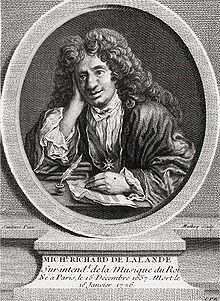

French composer. Joined the choir at St. Germain I'Auxerrois, Paris, in 1666; served as harpsichord tutor for certain nobles and as organist for several Paris churches until 1691. Competed successfully for one of the four posts as sous-maîtreat the royal chapel in 1683, and by 1714 had become the sole holder of all four appointments; similarly, he became one of the chamber composers in 1685, but by 1709 had complete control of the office. Named surintendant de la musique de la chambrein 1689, and maîtreof the same in 1695. Active also as a teacher; his pupils Destouches, Blamont, and La Porte later assumed many of his court duties. In 1722 he relinquished three quarters of his chapel responsibilities and was given the title of Chevalier of the Order of St. Michel. He was the most influential composer of grands motets,writing over 70 such works; greatly expanded in scope compared to those of his predecessors, they remained staples of the Concert spirituelrepertory until the Revolution.
His later reworkings of early motets provide the chance to examine evolution instyle and taste. Instrumental musicincludes Symphonies de noëls(carol settings) and Sinfonies pour les soupers du Roi(varied types of movements, some dance-related); he also wrote ballets, airs, and a variety of sacred works.